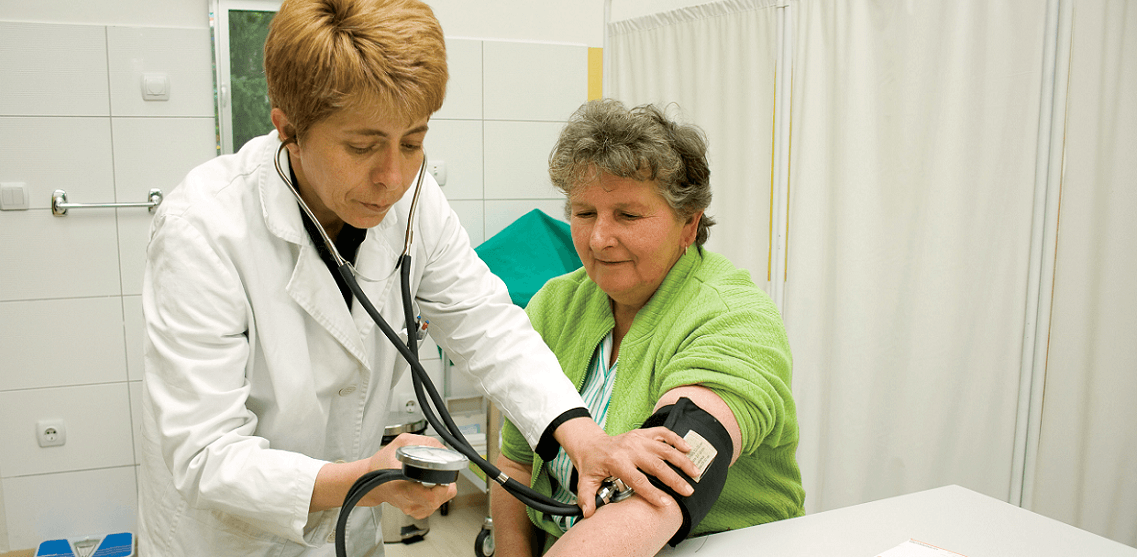 Doctor measures a patient's blood pressure with a cuff.
Doctor measures a patient's blood pressure with a cuff.
Bosnia and Herzegovina (BiH) spends 9 percent of its GDP on health care —high for a middle-income country. Yet, spending per person is three times lower than the European Union (EU) average and BiH citizens spend twice as much out-of-pocket on health care then the EU citizens . Not surprisingly, the quality of health care is among the lowest in Europe, public dissatisfaction is widespread, and health outcomes lag substantially behind the EU states. COVID-19 pandemic has only worsened this state of affairs, threatening to reverse years of hard-earned gains. An already frail health sector has exposed weaknesses in governance, exacerbating concerns over transparency, accountability, and fiscal sustainability.
A strong, coordinated institutional response is critical to delivering high-quality and people-centered care . Such an approach could also limit the social and economic impacts of the pandemic. So, what would be the best way to move forward with such response?
Key ingredients: Citizen engagement and better public financial management
The World Bank worked with the BiH governments through the Strengthening Transparency and Accountability of Bosnia and Herzegovina’s Health Systems Project to tackle this challenge. The project focused on two tracks: (1) designing and piloting innovative citizen engagement mechanisms and (2) developing policy options for strengthening public financial management (PFM) and procurement practices. These two factors are key to building a solid foundation for transparency and accountability in the health sector.
Implemented in partnership with the United Kingdom Agency for International Development (UKAID), under the UK Good Governance Fund (GGF), the Bank team worked alongside health ministries, healthcare providers, insurance funds and quality accreditation agencies in the Republika Srpska (RS) and Federation of BiH (FBiH) entities to boost accountability of both the ‘supply’ and the ‘demand’ for health services.

View Full Infographic
Designing and piloting citizen engagement mechanisms
A Citizen Engagement (CE) Framework provided an innovative mechanism, conceptual understanding, and strategies for providers and users of health services. Mainstreaming CE in the implementation of health reforms encouraged policy makers and service providers to think more explicitly of the benefits of CE on reforms.
Drawing on the Framework, a mock online platform has shown how health service users can connect with service providers to strengthen feedback mechanisms and provide information on health reforms and standards. The RS Health Accreditation and Certification Agency used this platform to develop and pilot an online Patient Satisfaction Survey in three healthcare facilities. Posters with a QR access code linked to a survey, resulting in over 360 patients’ responses. A digital facilitation App created an interface for dialogue among health service providers and users. These tools have helped the institutions be more transparent and efficient, while creating a constructive two-way dialogue with the public on how health services can be improved.

Consultations were conducted with several CSOs, reflecting an inclusive approach with feedback from a wide range of vulnerable users, including children, people with disabilities, and those with learning needs, mental health issues, and non-communicable diseases. A cohort of 37 civil society actors and health educators was established, all demonstrating sound knowledge of CE in health reforms. Women were overwhelmingly represented (90% of participants), reflecting both the role that women play in promoting more inclusive health service delivery for their families, and their own requirements for good quality health services.
Drawing on lessons learnt through the piloting process, Operational Guidelines were drafted to support the policy makers to implement the CE Framework and digital tools, while adjusting them for use in the BiH context.
Better transparency and accountability in public spending
BiH’s slow progress in improving health outcomes is largely due to financial sustainability challenges, driven by a limited fiscal envelope and poor management of available funding. Working closely with ministries of health in the FBiH, the Bank developed Pilot Studies on Strengthening Transparency and Accountability in PFM and Public Procurement in the country’s Health Systems to understand the challenges and identify solutions. The analyses were piloted in the Sarajevo and Tuzla Cantons, which together account for 47% of health expenditures in FBiH.
Informed by desk research, a survey of 33 health care providers, policy makers and health insurance funds, and interviews with 15 institutions, CSOs and bidders—the studies provided critical insight for policy makers and service providers with options and actionable recommendations for fortifying PFM and public procurement practices including through:
- strengthening governance ecosystems for PFM and public procurement
- improving the transparency, accountability, and public participation across the stages of the PFM and public procurement cycle
- strengthening integrity of stakeholders
- addressing broader constraints to accountability and efficiency of public spending.
FBiH health authorities and BiH Public Procurement Agency endorsed the recommendations recognizing their applicability across the jurisdictions. State level authorities have already adopted some of the proposed legislative changes through amendments to the Public Procurement Law in August 2022. These are applicable to the entire BiH public sector representing an important achievement of the project.
Despite some implementation challenges, including COVID-19 which led to delays and limited engagement, the Bank’s assistance made a major contribution in laying the foundation for longer-term transparency and accountability gains. The project demonstrates the effective citizen engagement (enabling citizens to have a voice on their healthcare) and sound PFM are both critical to build better healthcare systems in a transparent and accountable way.
Moving forward, health authorities in both entities are ready to scale up the project’s results in the upcoming Health Systems Improvement Project lending operation, a priority for the BIH governments. If BiH continues on this path, better healthcare systems and better institutions will be built—critical for the country’s human capital and citizens’ health and wellbeing.



Join the Conversation